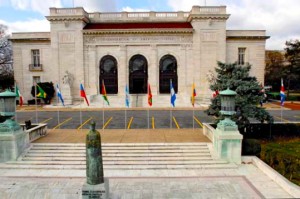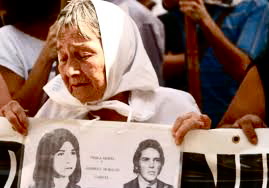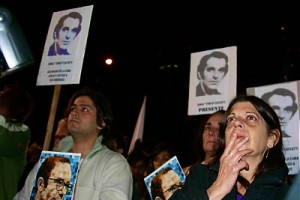Note: This debut novel by Edgardo David Holzman, published by Nortia Press, a new indie company, is one of the best debut novels I’ve read in years. Don’t miss it.
“Could you live here and not suspect? People were disappearing right and left, all over the country. Not a handful. Thousands. They were being held in secret camps, tortured and murdered by the government – all with the complicity of the police, the courts, the Church. And they weren’t low-lifes nobody would miss. They were lawyers, students, factory workers, priests. They had families, bosses, employees, neighbors, friends. Didn’t people wonder?”
 If this novel were a “thriller,” it might be possible to dismiss the horrors contained within it as fiction. Not so, with this book. This dramatic and heart-stopping novel recreates very real events of shocking, unimaginable brutality which take place in Argentina in the fall of 1979, three years after the end of the Peronist democracy, and you will not forget these events. After the military seizes power, the characters, as real as you and I, and with the same goals and dreams, have no alternative but to go about their lives trying to maintain a low profile, and as the atrocities continue, they soon affect these characters and the people they know and love. The novel becomes a revelation in which one cannot help but wonder, ultimately, how these atrocities were allowed to begin at all, and, even more importantly, how they were able to continue unimpeded within a country which was part of the Organization of American States. Was the belief, widely accepted outside Argentina, that subversives were trying to destabilize the country, and that dramatic steps were therefore needed to prevent anarchy, enough to justify the tortures and horrific deaths imposed on ordinary citizens? And why did no other country, especially the United States, ever sound the alarm?
If this novel were a “thriller,” it might be possible to dismiss the horrors contained within it as fiction. Not so, with this book. This dramatic and heart-stopping novel recreates very real events of shocking, unimaginable brutality which take place in Argentina in the fall of 1979, three years after the end of the Peronist democracy, and you will not forget these events. After the military seizes power, the characters, as real as you and I, and with the same goals and dreams, have no alternative but to go about their lives trying to maintain a low profile, and as the atrocities continue, they soon affect these characters and the people they know and love. The novel becomes a revelation in which one cannot help but wonder, ultimately, how these atrocities were allowed to begin at all, and, even more importantly, how they were able to continue unimpeded within a country which was part of the Organization of American States. Was the belief, widely accepted outside Argentina, that subversives were trying to destabilize the country, and that dramatic steps were therefore needed to prevent anarchy, enough to justify the tortures and horrific deaths imposed on ordinary citizens? And why did no other country, especially the United States, ever sound the alarm?

That is the question at the heart of this novel by Edgardo David Holzman, who grew up in Argentina and graduated from law school there, then went to Washington, D.C., in 1974 to work for the Organization of American States. As part of a delegation investigating the human rights situation in Chile a year after the Pinochet coup, he came face to face with stories of unimaginable atrocities. When Argentina joined the list of countries with military dictatorships in 1976, they used the same enforcement methods as Chile had used.
Ultimately, Holzman decided to write a novel about the period, believing that “Fiction, paradoxically, is the closest thing we have to real life. It seeks to stir the heart as well as the head. It’s where readers can inhabit characters, feel what those characters feel, and experience their world.” With this novel Holzman fully achieves his goals, and few readers will emerge from this story unscathed – or unashamed. In Malena he recreates the period and its horrors by keeping the focus squarely on a series of characters whom the reader comes to know and, in most cases, like, people so closely resembling the reader, regardless of cultural differences, that identification with the characters is easy and natural. Their fates become the fates of our “friends,” and their futures become the hopes and dreams any civilized human being would have for them.
 Kevin “Solo” Solorzano, an Argentine-born interpreter living in Washington, is sent to Buenos Aires to act as an interpreter for Admiral Rinaldi, Argentina’s Foreign Minister, during the visit of President Jimmy Carter. Rinaldi, very smooth, has hired an American PR firm for his speeches when he has been in the US, and he has spoken in the past to Senators Jesse Helms, Claiborne Pell, John Glenn, Bill Bradley, and Susan Sigal, a Representative from New York. Part of a delegation from the Organization of American States, Solo has not been to Argentina for sixteen years, but he looks forward to visiting with a dear friend, Malena Uriburu-Basavilbaso, daughter of a well-connected family and now the aide to the Ambassador to the US, and with Ines, a young woman he almost married when they lived together in New York City. Solo’s mentor, Alberto, in New York, has also asked him to take some money to his aunt and uncle in Argentina and see if he can find out what happened to their daughter, son, and daughter-in-law, who have disappeared.
Kevin “Solo” Solorzano, an Argentine-born interpreter living in Washington, is sent to Buenos Aires to act as an interpreter for Admiral Rinaldi, Argentina’s Foreign Minister, during the visit of President Jimmy Carter. Rinaldi, very smooth, has hired an American PR firm for his speeches when he has been in the US, and he has spoken in the past to Senators Jesse Helms, Claiborne Pell, John Glenn, Bill Bradley, and Susan Sigal, a Representative from New York. Part of a delegation from the Organization of American States, Solo has not been to Argentina for sixteen years, but he looks forward to visiting with a dear friend, Malena Uriburu-Basavilbaso, daughter of a well-connected family and now the aide to the Ambassador to the US, and with Ines, a young woman he almost married when they lived together in New York City. Solo’s mentor, Alberto, in New York, has also asked him to take some money to his aunt and uncle in Argentina and see if he can find out what happened to their daughter, son, and daughter-in-law, who have disappeared.

At the same time, Captain Diego Fioravanti, a young soldier caught up in events that are moving too fast for him, witnesses the beating and horrific assassination of three “subversives.” Though he has been a protégé of Col. Indart, his squeamishness about the events he witnesses raises questions about his suitability for his job, and he will be put to increasingly traumatic tests to be sure that his humanity has been wiped out. Diego is the lover of Ines, Solo’s former fiancée.
As Solo’s life and his experiences with Ines and Malena, unfold, often dramatically, the reader comes to know Solo as a warm and caring man of great humanity. His visits to prisons, where some inmates have insisted on telling him what is really happening there (though they know they will undoubtedly be killed for telling him) torment him, and as he learns more about the active involve ment of the Church in the massacres, about the secret deals that various officials have made with each other and with officials in the US and elsewhere, and about the tens of thousands of “desaparecidos” (“disappeared”) of whom there is no record at all, he is devastated. At the same time, he is also dealing with personal issues back home affecting his own family, while also investigating how his father drowned in a ship accident in Argentina sixteen years ago. The various characters come together when Diego, the unwilling soldier, is targeted for assassination.
ment of the Church in the massacres, about the secret deals that various officials have made with each other and with officials in the US and elsewhere, and about the tens of thousands of “desaparecidos” (“disappeared”) of whom there is no record at all, he is devastated. At the same time, he is also dealing with personal issues back home affecting his own family, while also investigating how his father drowned in a ship accident in Argentina sixteen years ago. The various characters come together when Diego, the unwilling soldier, is targeted for assassination.
Rich with history, the novel is populated by a large and well developed cast of characters. The reality of the events in which they find themsel ves is so horrific that every reader will cringe at what is happening to people with whom they can identify. The insights into the US position regarding the human rights abuses in these countries, and the secrecy with which they were treated are illuminating, as is the collusion of the Catholic Church in the abuses. Ranking among the best debut novels I have read in years, this novel is an incredible achievement, not only because of the subject matter, but because the pace and the plotting keep the reader on tenterhooks from beginning to end.
ves is so horrific that every reader will cringe at what is happening to people with whom they can identify. The insights into the US position regarding the human rights abuses in these countries, and the secrecy with which they were treated are illuminating, as is the collusion of the Catholic Church in the abuses. Ranking among the best debut novels I have read in years, this novel is an incredible achievement, not only because of the subject matter, but because the pace and the plotting keep the reader on tenterhooks from beginning to end.
Photos, in order: The author’s photo appears on his publisher’s website: http://nortiapress.com/
The OAS headquarters in Washington, DC: http://www.caribjournal.com
A woman marches, bearing witness to her missing children in Buenos Aires: http://mujereslibres.blogspot.com
On November 9, 2011, people gathered in Buenos Aires to await the verdict in the trial of twelve military officers accused of crimes against humanity carried out at the ESMA Navy Mechanics School, one of Latin America’s most notorious torture centers. All twelve were declared guilty and sentenced to life imprisonment. http://mujereslibres.blogspot.com/
The U. S. Embassy in Buenos Aires: http://www.msg-history.com
ARC: Nortia
